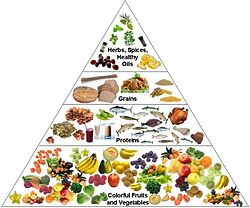
Nutritional epidemiology examines dietary and nutritional factors in relation to disease occurrence at a population level.[1] Nutritional epidemiology is a relatively new field of medical research that studies the relationship between nutrition and health.[2] It is a young discipline in epidemiology that is continuing to grow in relevance to present-day health concerns.[1] Diet and physical activity are difficult to measure accurately, which may partly explain why nutrition has received less attention than other risk factors for disease in epidemiology.[2] Nutritional epidemiology uses knowledge from nutritional science to aid in the understanding of human nutrition and the explanation of basic underlying mechanisms.[3] Nutritional science information is also used in the development of nutritional epidemiological studies and interventions including clinical, case-control and cohort studies.[4] Nutritional epidemiological methods have been developed to study the relationship between diet and disease. Findings from these studies impact public health as they guide the development of dietary recommendations including those tailored specifically for the prevention of certain diseases, conditions and cancers. It is argued by western researchers[1][5] that nutritional epidemiology should be a core component in the training of all health and social service professions because of its increasing relevance and past successes in improving the health of the public worldwide.[4] However, it is also argued that nutritional epidemiological studies yield unreliable findings as they rely on the role of diet in health and disease, which is known as an exposure that is susceptible to considerable measurement error.[6]
- ^ a b c Mccullough, Marjorie; Giovannucci, Edward (2006). Nutritional Oncology. Academic Press. pp. 85–96.
- ^ a b Michels, Karen (23 November 2010). "Nutritional epidemiology—past, present, future". Nutritional Epidemiology.
- ^ Wilett, Walter (2012). Nutritional Epidemiology. New York: Oxford University Press.
- ^ a b Alpers, David H.; Bier, Dennis M.; Carpenter, Kenneth J.; McCormick, Donald B.; Miller, Anthony B.; Jacques, Paul F. (1 September 2014). "History and Impact of Nutritional Epidemiology123". Advances in Nutrition. 5 (5): 534–536. doi:10.3945/an.114.006353. ISSN 2161-8313. PMC 4188224. PMID 25469385.
- ^ Thornton, K; Villamor, E (2016). Nutritional Epidemiology. Academic Press. pp. 104–107.
- ^ Margetts, Barrie M; Nelson, Michael (1997). Design Concepts in Nutritional Epidemiology. New York: Oxford University Press.
© MMXXIII Rich X Search. We shall prevail. All rights reserved. Rich X Search
